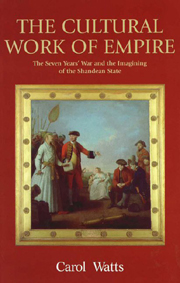Book contents
- Frontmatter
- Contents
- Acknowledgements
- List of Illustrations
- Abbreviations
- INTRODUCTION: THE CULTURAL WORK OF EMPIRE
- 1 LUNACY IN THE COSMOPOLIS (1759): EXPANSION AND IMPERIAL RECOIL
- 2 PATRIOT GAMES: MILITARY MASCULINITY AND THE RECOMPENSE OF VIRTUE
- 3 PRICKSONGS IN GOTHAM: OR, THE SEXUAL OECONOMY OF STATE IMAGINING
- 4 FRIENDSHIP, SLAVERY AND THE POLITICS OF PITY, INCLUDING A VISIT FROM PHILLIS WHEATLEY
- 5 WOMEN'S TIME AND WORK-DISCIPLINE: OR, THE SECRET HISTORY OF ‘POOR MARIA’
- 6 ‘BRAMIN, BRAMINE’: STERNE, ELIZA DRAPER AND THE PASSAGE TO INDIA
- 7 CONCLUDING ALONG SHANDEAN LINES
- Bibliography
- Index
6 - ‘BRAMIN, BRAMINE’: STERNE, ELIZA DRAPER AND THE PASSAGE TO INDIA
Published online by Cambridge University Press: 12 September 2012
- Frontmatter
- Contents
- Acknowledgements
- List of Illustrations
- Abbreviations
- INTRODUCTION: THE CULTURAL WORK OF EMPIRE
- 1 LUNACY IN THE COSMOPOLIS (1759): EXPANSION AND IMPERIAL RECOIL
- 2 PATRIOT GAMES: MILITARY MASCULINITY AND THE RECOMPENSE OF VIRTUE
- 3 PRICKSONGS IN GOTHAM: OR, THE SEXUAL OECONOMY OF STATE IMAGINING
- 4 FRIENDSHIP, SLAVERY AND THE POLITICS OF PITY, INCLUDING A VISIT FROM PHILLIS WHEATLEY
- 5 WOMEN'S TIME AND WORK-DISCIPLINE: OR, THE SECRET HISTORY OF ‘POOR MARIA’
- 6 ‘BRAMIN, BRAMINE’: STERNE, ELIZA DRAPER AND THE PASSAGE TO INDIA
- 7 CONCLUDING ALONG SHANDEAN LINES
- Bibliography
- Index
Summary
How oft have I smarted at the Idea, of that last longing Look by wch thou badest adieu to all thy heart Sufferd at that dismal Crisis—twas the Separation of Soul & Body—& equal to nothing but what passes on that tremendous Moment.—& like it in one Consequence, that thou art in another World; where I wd give a world, to follow thee
Laurence Sterne, Continuation of the Bramine's JournalGide's silliness: ‘Just finished rereading Werther, not without irritation. I had forgotten how long it took him to die [which is not at all the case]. He keeps going on and on, until you want to give him a push, right into the grave. Four or five times, what you had hoped was his last breath is followed by another even more ultimate one … the extended leavetakings exasperate me.’ Gide doesn't realize that in the novel of love, the hero is real (because he is created out of an absolutely projected substance in which every amorous subject collects himself) and that what he is looking for here is a man's death – is my death.
Roland Barthes, A Lover's DiscourseLaurence Sterne was never averse to turning his life and opinions into enterprise. This was also true of his death, parodically memorialised in Tristram Shandy's black page, and personified in the later volumes of the novel pursuing him relentlessly across France. Consumption finally caught up with him in an anonymous London lodging house in 1768.
- Type
- Chapter
- Information
- The Cultural Work of EmpireThe Seven Years' War and the Imagining of the Shandean State, pp. 247 - 290Publisher: Edinburgh University PressPrint publication year: 2007



